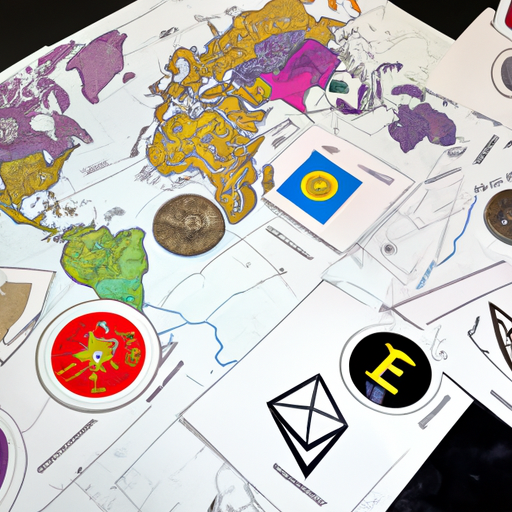I. Introduction
II. Geopolitical Factors Affecting Cryptocurrency Markets
III. Influence of Political Instability on Cryptocurrency Prices
IV. Geopolitics and the Regulation of Cryptocurrencies

Geopolitical Factors Affecting Cryptocurrency Markets
Hey there, fellow crypto enthusiasts! Today, we’re diving into the fascinating world of geopolitics and its impact on cryptocurrency markets. Strap yourselves in for a wild ride!
When it comes to cryptocurrencies, it’s easy to get caught up in the excitement of technological advancements and market trends. However, it’s important to remember that the world of crypto is not immune to the influence of geopolitical factors.
Geopolitics, in a nutshell, refers to the study of how geography, politics, and economics intersect. In the context of cryptocurrencies, it involves analyzing how global events and political decisions can affect the value and stability of digital assets.
So, why should you care about geopolitics when investing in or trading cryptocurrencies? Well, understanding these factors can help you make more informed decisions and navigate the volatile crypto market with a bit more finesse.
1. Government Regulations
One of the key ways geopolitics affects cryptocurrency markets is through government regulations. Governments around the world have varying attitudes towards cryptocurrencies, ranging from embracing them with open arms to outright banning them.
For example, when China announced a crackdown on cryptocurrency trading and initial coin offerings (ICOs) in 2017, it sent shockwaves through the market, causing a significant drop in prices. On the other hand, countries like Switzerland and Malta have adopted a more crypto-friendly approach, attracting blockchain businesses and fostering innovation.
As an investor, it’s crucial to stay up-to-date with the regulatory landscape in different countries. This knowledge can help you anticipate potential market shifts and adjust your investment strategy accordingly.
2. Economic Instability
Another geopolitical factor that can impact cryptocurrency markets is economic instability. When traditional financial systems face turbulence, investors often turn to alternative assets like cryptocurrencies as a safe haven or hedge against inflation.
For instance, during the Greek debt crisis in 2015, Bitcoin experienced a surge in demand as Greeks sought to protect their wealth from the devaluation of the Euro. Similarly, in countries with hyperinflation, such as Venezuela and Zimbabwe, cryptocurrencies have provided a lifeline for citizens looking to preserve their purchasing power.
Keep an eye on global economic developments, as they can have a ripple effect on cryptocurrency prices. Understanding the relationship between economic instability and crypto can help you make more strategic investment decisions.
3. Geopolitical Conflicts
Geopolitical conflicts, such as trade wars or political tensions between nations, can also impact cryptocurrency markets. These conflicts can create uncertainty and lead to a flight to safety, with investors flocking to cryptocurrencies as a decentralized and borderless store of value.
For example, when the United States and China engaged in a trade war, some investors turned to cryptocurrencies as a way to protect their assets from potential devaluation or confiscation. This increased demand can drive up prices and create opportunities for savvy traders.
Remember, geopolitical conflicts are complex and ever-changing. Stay informed and be ready to adapt your crypto strategy as events unfold.
Well, that’s a wrap for our exploration of how geopolitics affects cryptocurrency markets. Remember, understanding these factors can give you an edge in the ever-evolving world of crypto.
For more in-depth analysis and up-to-date news on the intersection of geopolitics and cryptocurrencies, check out Coindesk. They offer a wealth of information to satisfy even the most curious crypto enthusiasts.
Geopolitical Factors Affecting Cryptocurrency Markets
So, you’ve decided to dive into the world of cryptocurrency. Good for you! It’s an exciting and ever-evolving market that can offer great opportunities for those willing to take the plunge. But before you start investing your hard-earned money, it’s important to understand the geopolitical factors that can have a significant impact on cryptocurrency markets.
Now, I know what you’re thinking. Geopolitics? Isn’t that just a fancy word for politics? Well, yes and no. Geopolitics refers to the study of how geography, power, and politics intersect. And when it comes to cryptocurrencies, these factors can play a major role in determining their value and stability.
One of the key geopolitical factors affecting cryptocurrency markets is government regulations. Different countries have different approaches to cryptocurrencies, and their policies can have a significant impact on the market. For example, some countries, like Japan and Switzerland, have embraced cryptocurrencies and have created a favorable regulatory environment. This has led to increased adoption and investment, which in turn has driven up prices.
On the other hand, there are countries that have taken a more cautious approach. China, for instance, has cracked down on cryptocurrency exchanges and initial coin offerings (ICOs), leading to a decrease in trading volumes and a decline in prices. Similarly, countries like India and South Korea have expressed concerns about the potential risks associated with cryptocurrencies and have implemented stricter regulations.
Political instability is another geopolitical factor that can have a significant impact on cryptocurrency prices. When there is political turmoil or economic uncertainty in a country, investors often turn to cryptocurrencies as a safe haven. This increased demand can drive up prices. We saw this happen during the economic crisis in Greece in 2015, when the value of Bitcoin soared as Greeks looked for alternative ways to protect their wealth.
However, political instability can also have the opposite effect. In times of crisis, governments may impose stricter regulations or even ban cryptocurrencies altogether. This can lead to a decrease in demand and a drop in prices. Venezuela, for example, banned cryptocurrency mining in 2018 as part of its efforts to control the country’s economic crisis.
So, what does all this mean for you as a cryptocurrency investor? Well, it means that you need to stay informed and be aware of the geopolitical factors that can impact the market. Keep an eye on government regulations and political developments in countries that are key players in the cryptocurrency world. Stay updated on news and analysis from reputable sources, and don’t be afraid to seek advice from experts.
Remember, investing in cryptocurrencies can be a rollercoaster ride. Prices can fluctuate wildly, and geopolitical factors can add an extra layer of volatility. But with the right knowledge and a cautious approach, you can navigate these challenges and potentially reap the rewards.
So, buckle up and get ready for the exciting world of cryptocurrency. Just don’t forget to keep an eye on geopolitics along the way!
Geopolitics and the Influence of Political Instability on Cryptocurrency Prices
Ah, geopolitics, the thrilling world where politics and geography collide! Now, let’s dive into how these factors can affect the prices of our beloved cryptocurrencies. Buckle up, my friends, because things are about to get interesting!
1. Political Instability and Crypto Prices: A Match Made in Chaos
When political instability strikes, it can send shockwaves through the cryptocurrency markets. Why? Well, investors get a little jittery when they see governments in turmoil. It’s like watching a game of Jenga, but instead of wooden blocks, it’s the stability of a country that’s being pulled out from under them.
Think about it this way: if a country’s political situation is uncertain, investors may lose confidence in the government’s ability to regulate and support cryptocurrencies. This lack of trust can lead to a decrease in demand and, ultimately, a drop in prices.
2. Safe Haven or Risky Business?
Now, here’s where things get interesting. While political instability can cause some investors to flee from cryptocurrencies, others see them as a safe haven in times of uncertainty. It’s like seeking refuge in a stormy sea by jumping on a crypto lifeboat.
During times of political turmoil, some investors view cryptocurrencies as a way to protect their wealth from potential economic downturns or government interference. This increased demand can actually drive up the prices of cryptocurrencies, creating a paradoxical situation where instability fuels their value.
3. Expert Advice: Stay Informed, My Friends!
In the ever-changing world of geopolitics, it’s essential to stay informed about political developments that could impact cryptocurrency prices. Here are a few tips to help you navigate these murky waters:
– Follow the News: Keep an eye on political events and policy changes that could affect the crypto landscape. Stay informed about regulations, government stances, and any potential crackdowns. Knowledge is power, my friends!
– Diversify Your Portfolio: As with any investment, diversification is key. Don’t put all your digital eggs in one crypto basket. Spread your investments across different cryptocurrencies and even traditional assets to mitigate risks associated with political instability.
– Seek Expert Advice: If you’re feeling a bit overwhelmed by all this geopolitical mumbo-jumbo, don’t hesitate to consult with a financial advisor or cryptocurrency expert. They can provide valuable insights and help you make informed decisions.
4. Conclusion: Riding the Geopolitical Waves
In the exciting world of cryptocurrencies, geopolitics can be a double-edged sword. Political instability can both dampen and boost prices, depending on investors’ perceptions and market dynamics. It’s like a rollercoaster ride where you never know what’s coming next.
To navigate these unpredictable waters, stay informed, diversify your investments, and seek expert advice when needed. Remember, my friends, knowledge and a dash of caution are your best allies in this thrilling crypto adventure!
Now, go forth and conquer the crypto world with your newfound understanding of geopolitics and its impact on cryptocurrency prices. Happy investing, my savvy friends!

